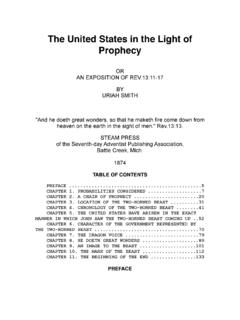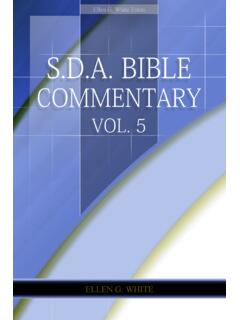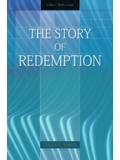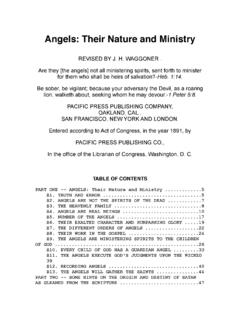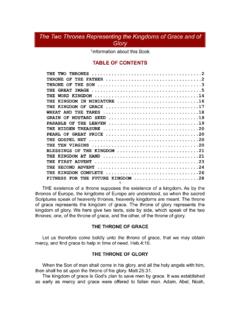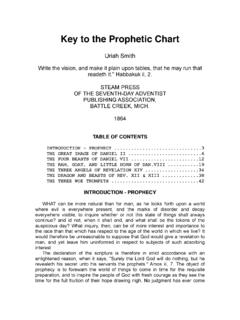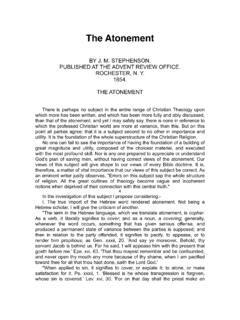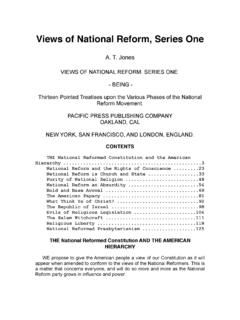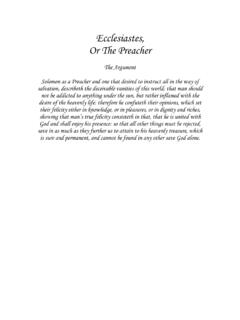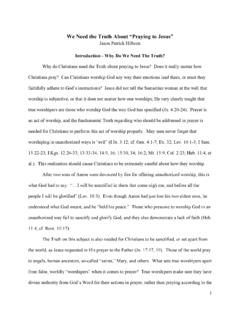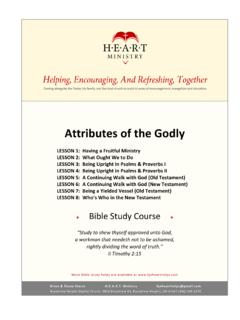Transcription of The Missionary Magazine Articles (1898-1902)
1 The Missionary Magazine Articles (1898-1902)The Medical Missionary , Vol. 10 (1898)June 28, 1898"Fourth Sabbath Reading. What the Church Owes the World" The Missionary Magazine 10, J. WaggonerThe church of Christ occupies a peculiar position in the world. Its members are comparatively few, and are mostly poor; for God has chosen the poor of this world (James ii: 5), and not many wise men after the flesh, not many might, not many noble are called (1 Cor. i: 26); yet this poor, despised company, whose only legacy from this world is tribulations and afflictions (read John xv: 19-21; xvi: 33; 1 Thess.)
2 Iii: 3) owe to the world a debt which can scarcely ever think of it. The sentiment which finds expression in the blunt statement, "The world owes me a living," has insidiously crept into the church, and has affected to a great degree many of its members who are perhaps unconscious of it. But such a sentiment as this is directly opposite to the spirit of Christ-the spirit that must be in every one of His true followers. Let us together read some of the scriptures which set before us our true relation to the world. In 1 John ii: 6 we read these words: "He that saith he abideth in Him ought himself also so to walk, even as he [Christ] walked.
3 " True Christians are those who abide in Christ; for those that do not abide in Christ, are cast forth, and are gathered to be burned. John xv: 6. The word "ought" implies something owed; therefore the members of Christ's church owe it to Him to walk as He walked. They cannot walk otherwise, as long as they abide in Him; and if they walk otherwise while professing to abide in Him, they bear false witness against Christ. Now what was Christ's life here on earth? He Himself tells us: "The Son of man came not to be ministered unto, but to minister." Matt. xx: 28. He gave Himself for the world; He offered Himself as a servant to the world.
4 Therefore if we abide in Him, walking as He walked, we shall likewise consider ourselves servants to all. This shows that all Christ's followers must be servants; but the question arises, What do we owe? It is evident that each one owes just what he has received. What, then, have we received? We have received the riches of the grace and mercy of God. The apostle Paul tells us that in Christ, the Beloved, "we have redemption through His blood, the forgiveness of sins, according to the riches of His grace." Eph. i: 7. Again he says: "But God, who is rich in 216mercy, for His great love wherewith He loved us, even when we were dead in sins, hath quickened us together with Christ, (by grace ye are saved); and hath raised us up together, and made us sit together in heavenly places in Christ Jesus: that in the ages to come He might show the exceeding riches of His grace in His kindness toward us through Christ Jesus.
5 Eph. ii: 4-7. To the Romans, also, he writes that we have received "abundance of grace." Rom. v: 17. Turn now to the words written by the apostle Peter: "As every man hath received the gift, even so minister the same one to another, as good stewards of the manifold grace of God. If any man speak, let him speak as the oracles of God; if any man minister, let him do it as of the ability which God giveth: that God in all things may be glorified through Jesus Christ, to Whom be praise and dominion for ever and ever." 1 Peter iv: 10, 11. The gift which we have received is the gift of grace, and we have received it freely and abundantly; and as we have received it, so are we to minister the same to others.
6 "No man liveth to himself." We have received the gift, not for our own exclusive benefit, but only as stewards, that we may as freely distribute it as we have received it. This is in harmony with our Lord's injunction to the twelve when He sent them out the first time: "Freely ye have received, freely give." Matt. x: 8. Of course we cannot of ourselves impart to others the grace of God; but we can become workers together with God by making known to others that which we have heard and seen and received. As ambassadors for Christ, as though God did beseech men by us, we are to pray them, in Christ's stead, to be reconciled to God.
7 2 Cor. v: 20. The command of the Spirit is, "And let him that heareth say, Come." Rev. xxii: 17. One of the ways in which we can work with Christ in discharging our debt to the world, is by giving of our means. This is in the direct line of Peter's injunction to minister to others the grace of Christ, which we have received, for the apostle Paul says: "For ye know the grace of our Lord Jesus Christ, that, though He was rich, yet for your sakes He became poor, that ye through His poverty might be rich." 2 Cor. viii: 9. He counted not the riches and glory of heaven a prize to be grasped and held for His own use, although they were His by right; but He divested Himself, and took upon Him the form of a servant.
8 (See Phil. ii: 4-7). Jesus gave all the wealth of heaven for the redemption of the world. He became poor, that He might make others rich. He was under no obligation to do this; but we who have received the gift, and who have nothing that we have not received (John xv: 5; 1 Cor. iv: 7), owe all we have to Christ; and since he has given himself and all that he possessed to the world, it follows that what we owe to Christ we owe to the world. We give to Christ by giving to carry the message of His grace to the world. We may be poor in this world's goods, yet this does not relieve us from responsibility. We have on record for our example the churches in Macedonia, "How that in a great trial of affliction, the abundance of their joy and their deep poverty abounded unto the riches of their liberality.
9 " Even beyond their power 217they were willing of themselves; and this they did because they "first gave their own selves to the Lord." 2 Cor. viii: 1-5. Let it not be overlooked that this was the result of the grace of God bestowed on them. (See verse 1.) From their example we may learn how we may be counted "good stewards of the manifold grace of God." We have already learned that Christ came into the world to minister as a servant, and that as followers of Him we owe our service. Now we read what he says of His disciples, in His last recorded prayer for them. John xvii: 18: "As thou hast sent Me into the world, even so have I also sent them into the world.
10 " Our work, therefore, is the same as His. What a wonderful thought, that we are permitted to do a part of the same work that Christ came to do! Now turn to John xviii: 37, and read His words concerning why He came into the world: "To this end was I born, and for this cause came I into the world, that I should bear witness unto the truth." Then since we are sent into the world as He was sent into the world, we owe to the world a perfect testimony, both by word and practice, concerning the truth. Christ, who is the truth, says to His people, "Ye are My witnesses.
